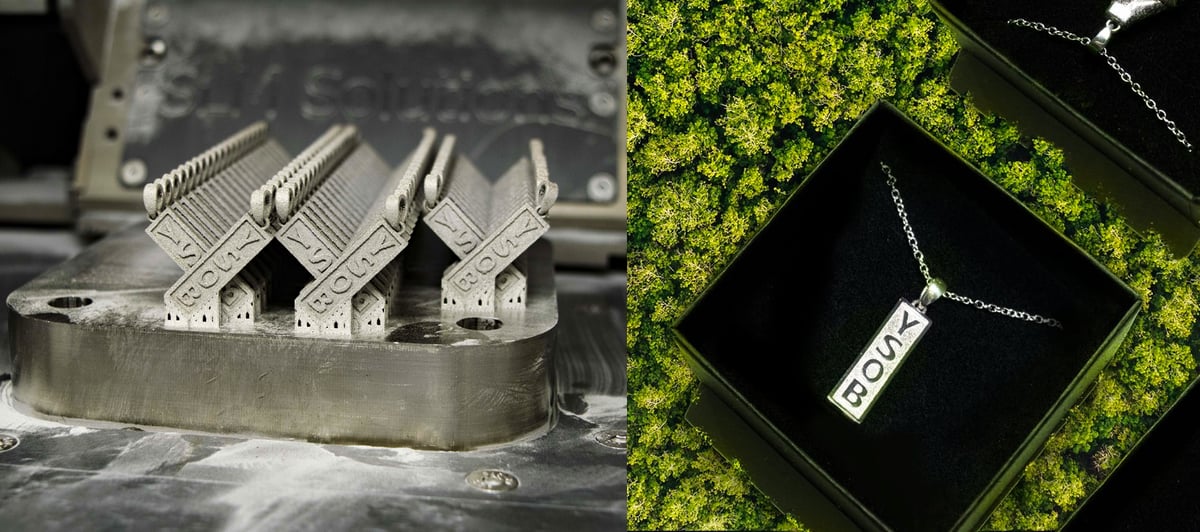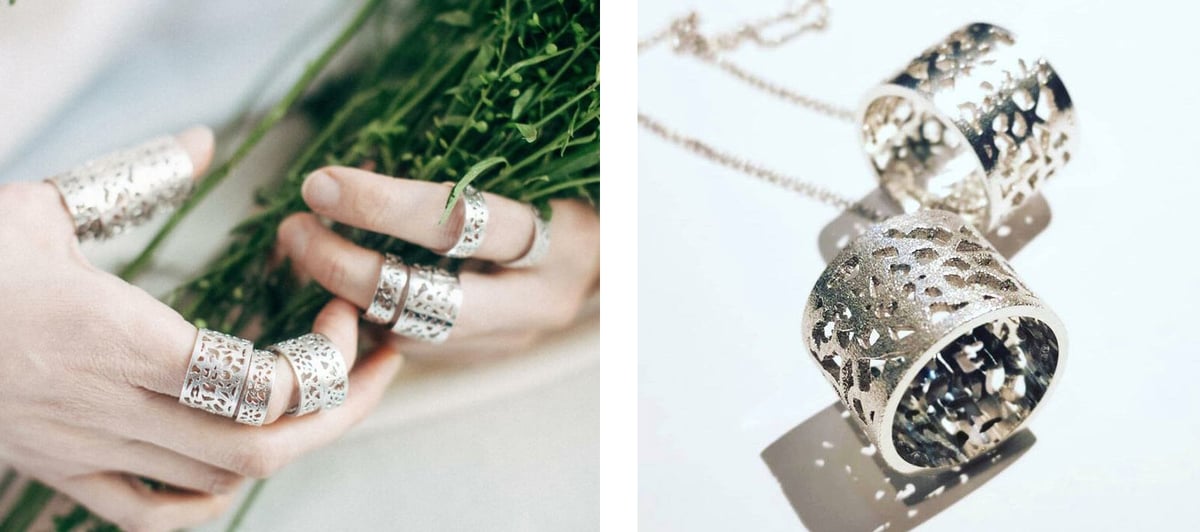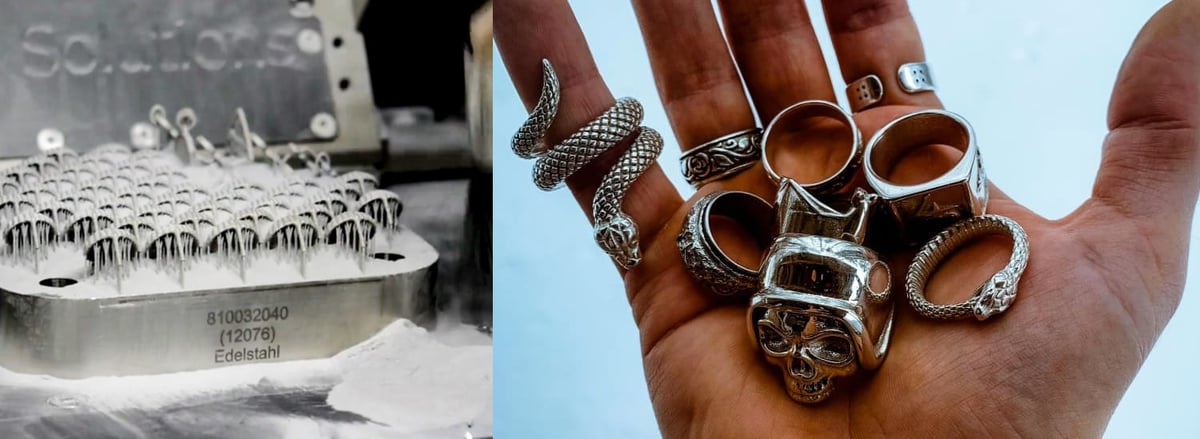Owning a personal brand with accompanying merch is a multimillion dollar business today. YouTube influencers, gamers, and Instagram celebrities all extend their reach with custom logo hoodies and caps sold to Gen-Z followers eager to reflect their lifestyle.
Although easy to customize and mass produce from relatively anywhere, T-shirts and knit hats have become somewhat stale as the go-to options for fan merch. Silver jewelry may be the next frontier, and it’s a niche practically made for metal 3D printing on-demand.

Unique Silver Jewelry Made to Order
When former pro skateboarder and controversial TV personality Brandon Cole “Bam” Margera wanted to establish a lifestyle brand, he chose to design 3D printed silver pendants, rings, and necklaces in collaboration with Estonian start-up Cloud Factory. Bam Margera merchandise is now one of the best-selling of any signature series in action sports. Cloud Factory offered all the services needed to turn this celebrity into a jewelry designer and get merch to fans at a speed and cost not possible with traditional jewelry-making methods.
“We are bringing a new dimension to an often outdated sector by simplifying the processes of creating and launching personal jewelry products,” says Kati Kask, co-founder and COO of Cloud Factory. “Currently there is no other company in the world offering the same manufacturing model as the one we’ve developed.”
Capitalizing on the mass-customization and fast design-to-production capabilities of metal 3D printing, Cloud Factory may actually be the world’s first to use direct metal 3D printing silver to scalably manufacture custom jewelry.
The company’s in-house printing processes and post-production operations enable them to use metal 3D printing for volume manufacturing jewelry that’s both cost-efficient and sustainable, Kask says. The flexible 3D printing process allows clients to launch products quickly and adjust merchandising selections according to new content or fast-changing trends.

Cloud Factory employs a method of 3D printing that uses a laser to fuse metal powder layer by layer to build the final design. Called laser powder bed fusion (also selective laser melting), it’s the most popular metal 3D printing technology. It can produce dozens or hundreds of unique pieces at a time.
The company uses an SLM125 3D printer from German manufacturer SLM Solutions and will have an additional and much larger SLM280 machine in November. The silver power used is a sustainable material introducing green tech to the jewelry industry, the company says.

Zero Waste, Sustainable Jewelry
In line with the Gen-Z ethos, sustainability plays a large role in Cloud Factory’s business model. The 925 sterling silver powder they use is 100% recycled from precious metals sources.
“In the jewelry industry, one of the main factors that impacts the environment is the metals supply source,” says Kask. “Using recycled metal, instead of finite virgin ores, reduces air pollution by 80%, water pollution by 76%, and water use by 40%. Our raw materials supplier sources all of its precious metals exclusively from refining, as opposed to mining … and by reusing it, we are preserving natural resources and creating less of an impact on the planet, and avoiding the creation of waste in the production process.”
The printing process is zero waste because the silver powder left over from one printing process can be reused for the next. Plus, on-demand additive manufacturing model enables Cloud Factory to take orders directly from clients’ online portals and print to order, instead of housing inventories of products that may never be sold. The company also says its entire operation has an 80% smaller carbon footprint than a similar-sized traditional jewelry maker.
According to a recent report from luxury brand consultants Matter of Form, the jewelry industry is set to be worth $480 billion by 2025 despite a 25% dip in sales for watch and jewelry makers during the COVID-19 pandemic. Cloud Factory avoided a sales drop in the pandemic, it says, because most of its processes, including creation, order, and delivery are done remotely. “While physical jewelry productions across the globe temporarily closed, Cloud Factory’s online orders kept growing as it saw a 213% increase in sales across 2020 in comparison to 2019.”
When it comes to look and quality, Cloud Factory says there’s no “visible difference between traditionally manufactured and 3D printed jewelry. The only difference can be in the design as direct 3D printing enables to create textures and structures that are otherwise impossible to make.”

On-Demand Service & Manufacturing Model
Not relying solely on being a manufacturer, Cloud Factory is also a design-service company, distributor, and e-commerce order management platform. Clients do not need to know anything about design, 3D printing, or jewelry. It’s a fully managed service that offers concept building, manufacturing, branded packaging, and drop shipping.
The company’s client list includes the direct-to-fans crowd-selling platform, Represent; Europe’s leading provider of alternative merchandise, EMP; and individual artists such as YouTuber and gamer CoryxKenshin, American rapper GOT7, Mark Tuan, and DJ Alan Walker.
The success of the Cloud Factory model has recently attracted $2.1 million in seed round funding led by Change Ventures, an early-stage fund in the Baltics. Participants in the round include Superhero Capital, a seed-stage venture capital firm based in Finland, and angel investors Artis Kehris (Printify co-founder) and Andrius Šlimas (Oberlo co-founder and CEO).
Cloud Factory, co-founder and CEO Taavi Kikas says the company will use the investment to increase its manufacturing capacities and further develop its online platform to meet the demands of the new era of celebrities and lifestyle brands.
License: The text of "3D Printed Custom Silver Jewelry Becomes an Influencer Trend" by All3DP Pro is licensed under a Creative Commons Attribution 4.0 International License.